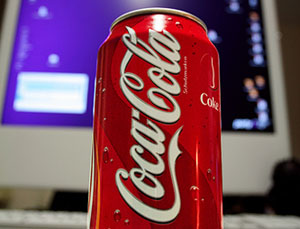Coca-Cola Amatil targets Asia for SAP platform upgrade

After completing its AU$65 million OAisys (One Amatil information system) project to move to a single SAP platform in Australia and New Zealand this year, Coca-Cola Amatil (CCA) has turned its eye to Indonesia.
The project, which began in 2008, aimed to roll 120 legacy systems onto one SAP platform. It was divided into three phases in the business, with the first two phases upgrading finance and human resources back-office systems, CCA's call centre, equipment service, warehousing, payroll, supply chain management, and demand planning systems. Phase three involved getting New Zealand's systems on board, and in the first half of 2012, this project was completed.
Coca-Cola Amatil Chief Information Officer Barry Simpson said that the company would take what it learned from the project in Australia and New Zealand, and expand OAisys to Indonesia, where the company has 30 production lines, 100 distribution centres and employs over 8,000 people.
"We've completed the OAisys program across Australia and New Zealand, and we're now looking at leveraging that technology across our Indonesian business. And so we're going through the planning phases of that," he told ZDNet.
"I think the key learnings [from the original project] were that the way we were able to segment the program and minimise the risk to the business as we successfully deployed it. Taking that kind of approach to Indonesia, which has a large transaction volume as well, and is a large scale business, which has lots of manufacturing sites and distribution centres, we think that approach will serve us very well," he said.
CCA will dedicate people to the project who gained experience in the Australian and New Zealand rollout, and Simpson said that the company would manage the risk by leveraging CCA's systems across other Asian countries during the rollout.
Last week, the company signed a deal with Telstra that will see 3000 digital media signage units deployed in bars and other drink venues that will allow customers to get 30 minutes of free Wi-Fi access to Telstra's mobile network. Simpson said that the deal was part of a broader AU$150 million 10-year with Telstra that has been working well for the company.
"The agreement in general, I think, has worked out really well for us. Because it is a long term agreement, we spend a long time planning on future directions, and that allowed us to bring things like the Wi-Fi and digital media offers to market," he said.
"As we continue to plan together, we're growing services with Telstra, and the interconnection between the two companies is certainly growing," he said.
Telstra was originally brought on to manage CCA's voice and data networks, and a selection of internet gateway services. Since then CCA has migrated a number of customer-facing systems, and the Cisco call centre platform into Telstra's cloud infrastructure.
In 2010, the company migrated close to 9000 e-mail inboxes, 70 servers, and 700 mobiles from Lotus Notes to Microsoft's Business Productivity Online Standard Suite (BPOS). Simpson said that Telstra now hosts the company's e-mail system through Microsoft Office 365.
The original Telstra deal included BlackBerry mobile devices for its mobile fleet, but now Simpson said that staff can choose between BlackBerry and Apple's iPhone.
"As part of that agreement, we have opened up iPhone and BlackBerrys to our people, and have given them a choice. Overwhelmingly, people are moving to iPhone. We decided to let the consumer decide, our systems are architected so we can use either, but the end consumer is certainly adopting the iPhones at a much greater rate," he said.
CCA has also been trialling Bring-Your-Own-Device (BYOD) with its staff, with a mixture of laptops, iPads, and Android tablets, but Simpson said that it was currently too difficult to justify the cost for virtualisation to allow staff to use these devices every day. He said that eventually, the cost would come down, and he saw BYOD as an inevitability.
"We think it is inevitable, as people's personal lives and work lives mix further and further together, and as the consumer devices and work devices get closer together," he said."We would be keen to find a solution; our challenge is to do that cost-effectively."
At the same time, CCA is in the process of migrating onto Windows 7. Simpson said that the company doesn't reimage machines, but as desktops are replaced every three years, the new models are rolled out in batches across the company and come loaded with Windows 7.
While the company was keen on moving to cloud products where appropriate, Simpson said core transaction systems were best kept internally, because the company needed cost-effective guaranteed performance levels, but he said that the company was flexible about that.
"Even in [our core transaction systems] we're working with IBM to give us flexible capacity, so that even though it is a dedicated hosting environment, if we need to flex capacity up, we can do that with IBM, so we're not carrying the full cost of the equipment when we don't need it," he said.
